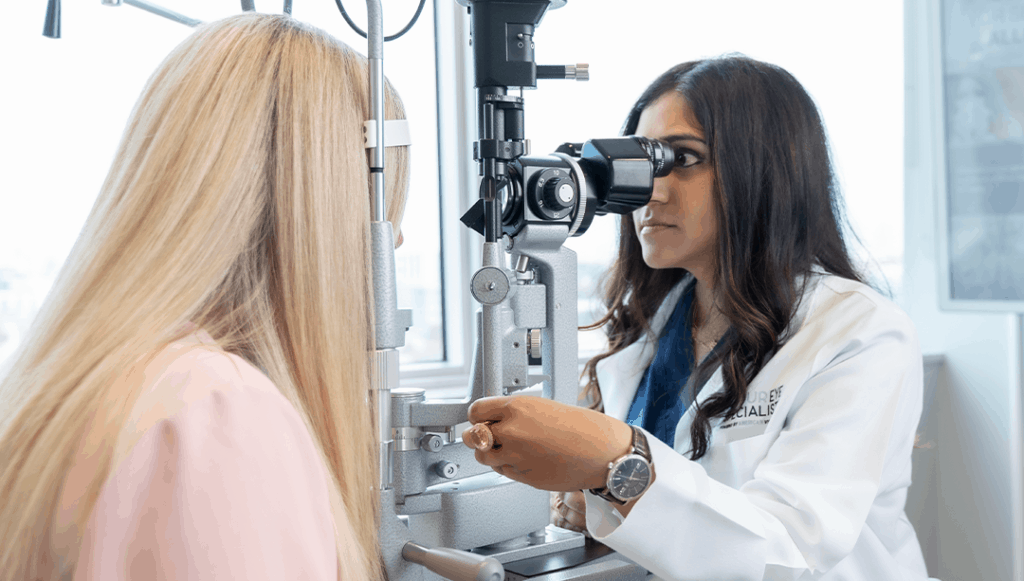Dry Eye Syndrome
Many people struggle with dry eyes. The prevalence of this complaint, however, does not take away from the troublesome nature of its symptoms.
Patients with dry eyes suffer from a lack of adequate tears. Your tears are a complex mixture of water, oils, and mucus.
This combination helps smooth and clear the surface of your eye, preventing any infection.

What Causes Dry Eyes?
Some people’s dry eyes are created by tear evaporation and an imbalance in the consistency and makeup of their tears. Several factors can cause your eyes to produce less tears than they should. Some of these factors include:
- Medications such as antidepressants, antihistamines, and decongestants.
- Increasing age
- Laser eye surgery
- Diabetes
- Lupus
- Vitamin A deficiency
- Time looking at a computer screen
- Smoking, or exposure to secondhand smoke
- Indoor environments with too much air circulation
Decreased tear production is the single most common reason for dry eyes. When the body cannot produce enough tears, the outer layer of the eye begins to dry and grow red from irritation. Without proper tear production, an infection may occur. Decreased tear production occurs due to aging, medical conditions, or damage to tear glands. After laser eye surgery, many patients experience a temporary drop in tear production.
If you have concerns about dry eye, don’t hesitate to contact us today to schedule an appointment with one of our doctors.
Dry eye syndrome is a very common condition, affecting millions of Americans annually. Dry eye syndrome is a condition that is more prevalent in the elderly and female population.
Approximately 10-15% of adults over the age of 65 suffer from dry eye syndrome. Many patients also suffer from ocular allergies, which can exacerbate the problem. For some patients, dry eye is a symptom of an underlying endocrine or immunologic condition, such as thyroid disease, Sjogren’s syndrome, or rheumatoid arthritis.
Tears are made up of three layers: oil, water, and mucus. Each component serves a function in protecting and nourishing the front surface of the eye. The oil layer is in place to prevent evaporation of the water layer. When there is a deficiency in the gland that produces the oil layer, the water layer can evaporate quickly, causing the feeling of dry eyes.
Symptoms of dry eye syndrome include:
- Irritation
- Redness
- Burning or stinging
- Watery eyes
- Blurry vision
- Foreign body sensation
There are millions of people who experience dry eye regularly. Some are merely due to changes in weather; others are more serious, though. Thankfully, there are diagnosis and treatment options available. When it comes to a diagnosis, your physician can:
- Perform an Eye Exam – A comprehensive eye exam will include a full history of your health and eye health, which helps diagnose the cause of your current dry eyes.
- Measure Tears – Measuring the volume of tear production using the Schirmer test.
- Review Quality – Determining the quality of your tears using special dyes in eye drops helps to determine specific surface conditions. Staining patterns on the corneas and measurements of tear evaporation will help dry eye diagnosis.
When it comes to treatment, occasional or mild symptoms can be treated using artificial tears and over-the-counter eye drops. For more severe symptoms, further treatment is required from a specialist. Reversing or managing the condition is the overall goal.
There is no cure for chronic dry eye syndrome, but there are methods of dry eye treatment that can help manage the annoying symptoms of dry eye. Over the counter lubricating eye drops are available, and if those do not work for you, you can speak with your doctor about the best course of treatment. Your doctor may prescribe you with an eye drop medication called Restasis that will stimulate your natural tear production for dry eye treatment. Tear duct plugs are another option, usually used when eye drops are not sufficient to control symptoms.
Environmental changes may also aid to control symptoms of dry eye syndrome. Steps can be taken, such as limiting your exposure to smoke or using a humidifier to create a better environment for tear production. Obtaining allergy treatment may also be beneficial. Eating a well-balanced diet with plenty of omega-3 fatty acids, or taking them as a supplement, has been shown to improve dry eye symptoms over time.
What People Are Saying About Us
Trust Your Vision to South Florida’s Premier Eye Doctors
Saying YES is all it takes!


